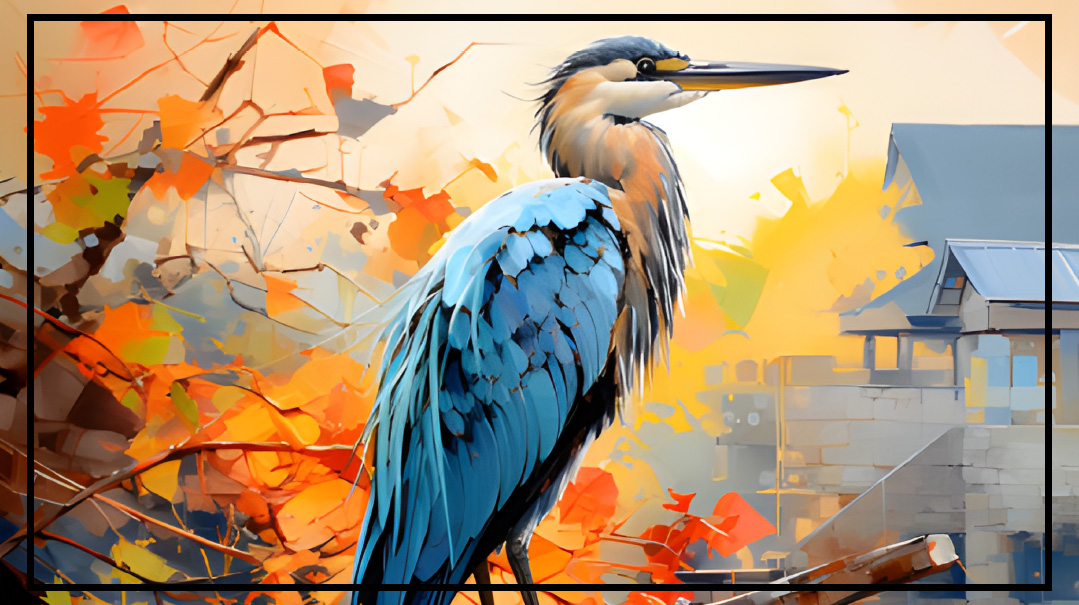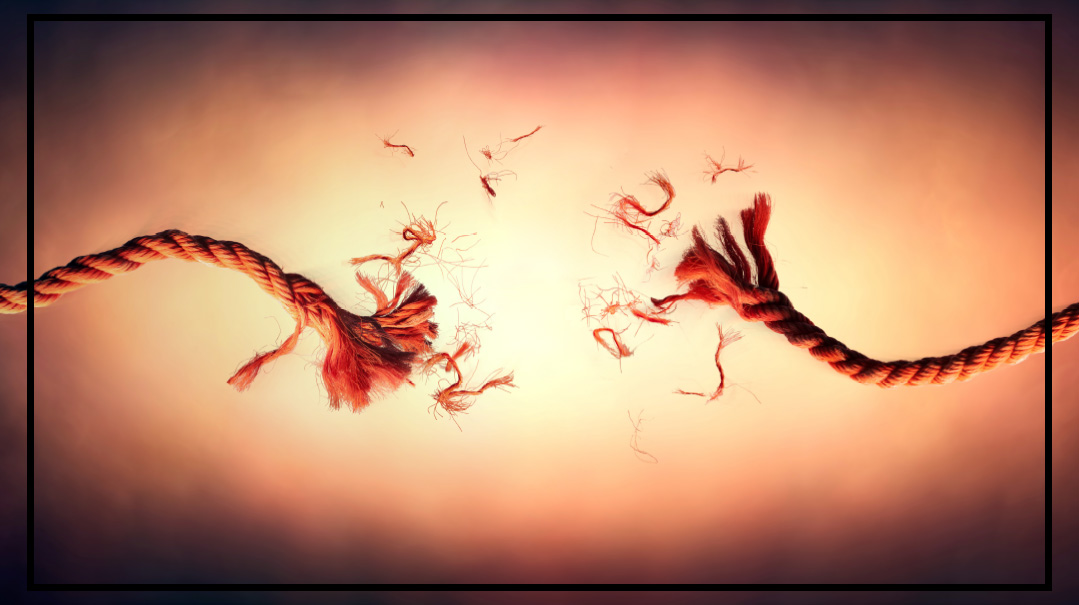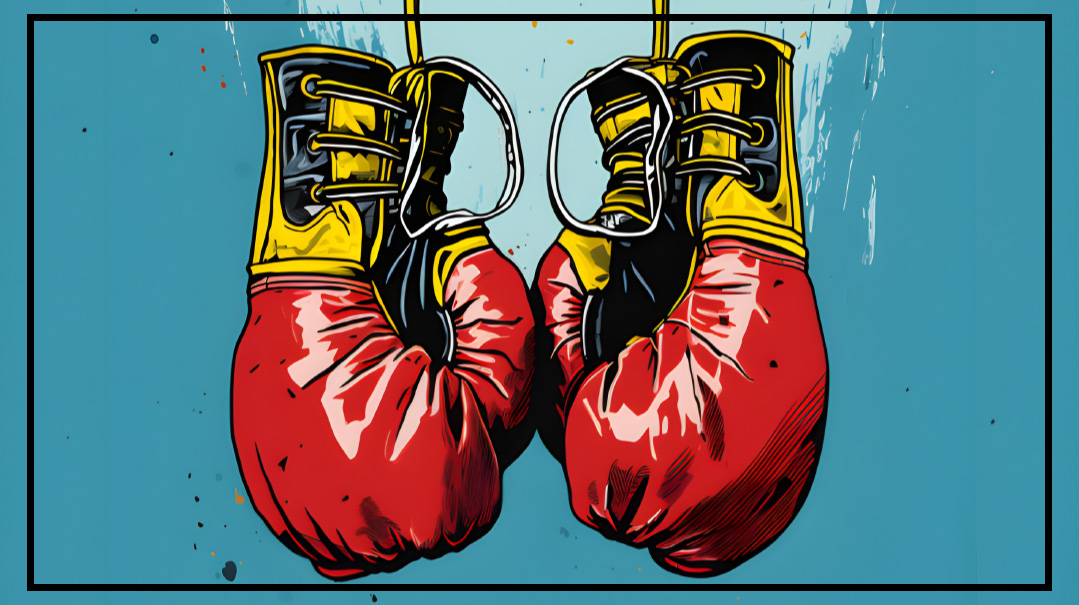Fly Away
| September 26, 2023“I think we should call the police,” Mr. Laufer says, and Baila’s heart sinks with heavy, unsurprised disappointment. What accusations will they level against Mikki?

IT comes down to — of all things — a rabid raccoon on a Shabbos morning.
Well, Mikki will dispute the rabid portion of that, but that comes later.
They are walking back from shul together. Fenwood’s shul is large and elegant, nothing like the crowded little converted houses and the squat one-room buildings back in Rayon. The women here are old enough to be Baila’s mothers, and they all attend shul in light-colored dresses and matching hats. It’s their weekly social event in a town where houses and people are equally distant, and it’s the one way that Baila might make friends in Fenwood.
Instead, she arrives late and leaves before the kiddush, Mikki trailing behind her and Dovid hastening to meet them in front. They’re in Fenwood to avoid getting to know people, and they’ve made it four months without incident. No one here is unfriendly, exactly. If Baila speaks to a neighbor, she doesn’t doubt she’ll get a polite response. But the lack of community here is what had made Fenwood so appealing in the first place.
No one here asks questions. No one here watches Mikki the way all of Rayon had. No one but Baila herself, gripped with uncertainty each time she catches sight of her 17-year-old daughter.
Mikki walks behind them on the way home, beneath large trees and the ever present squawking of birds, and Baila tries, as an exercise, not to turn to check on her. The big, sprawling lawns they pass have nothing portable at their front, nothing Mikki can walk past and then — sleight of the hand, a quick movement — secrete into her dress. Not like MP3 players and phones at Bais Yaakov Rayon, like piles of school property that they’d found in Mikki’s closet after the accusations.
Removing her from that environment was the best thing you could have done for her, Mikki’s therapist had reassured Baila last Thursday. Baila doesn’t know if that means Mikki is recovering, if that means she can unlock the little box under her bed where she’s taken to keeping her jewelry. Dovid is uneasy about the box. Baila is uneasy when she drives out to work, leaving Mikki alone in the house.
But it’s Shabbos, and Baila is trying to trust Mikki, so she doesn’t turn, and misses the moment when Mikki stops following them down into the cul-de-sac.
“Mom!” Mikki calls, and Baila doesn’t react to it as much as Mikki’s voice.
Mom is something new, when even Baila’s three married daughters still call her Mommy. Less new is the alarm in Mikki’s tone.
“Wait. Look.”
Baila turns, follows Mikki’s finger, and spots it. There’s a raccoon out in broad daylight, staggering across the end of the cul-de-sac.
“Too much schnapps at the shalom zachar, huh?” Dovid says lightly.
Mikki doesn’t laugh.
“Something’s wrong. It looks disoriented. I think it’s sick.”
“Then let’s get inside before we all contract rabies,” Baila says, moving a safe distance away from the raccoon. It doesn’t seem to notice their approach. Instead, it puts one clawed paw onto the curb, heaves itself up, then slips and rolls onto its back. It lies still for a few minutes as they watch.
That’s the end of the raccoon, Baila decides, and she strides inside.
* * *
Their Shabbos meals are shorter than they’d been before Fenwood. Here, there’s no company except when the older girls come to visit. There’s just Baila and Dovid at the table, making polite conversation. Mikki eats a piece of challah, a piece of fish, and a piece of chicken, then bentshes and makes a getaway to her room before Dovid can begin a devar Torah or Baila can try to make small talk.
Today, though, Mikki doesn’t go upstairs. Instead she glances out the window at the grey lump on the street, her honey-blonde eyebrows scrunching as she eats. When she’s done, she goes to the door, sits on the porch chair, and watches the raccoon with laser like focus.
“We should’ve just gotten her that puppy she’d wanted,” Dovid says ruefully. “If a raccoon could get her out of her room—”
Baila laughs. She takes the opportunity to watch Mikki from afar, through the big picture window in the living room. Mikki is smaller now than she had been a year ago, her face thinner and her frame lanky and hollow. She looks younger than 17, just a slight child. Not problematic. Rebbetzin Gordon, the principal of her old school, had called her problematic during that final meeting, the one in which Mikki had been firmly expelled from Bais Yaakov Rayon. The word still rolls around in Baila’s head, imprinting itself against the walls of her mind until that is all she sees sometimes.
She can’t stop the instinctive fear that bubbles up when, across the cul-de-sac, a well-dressed woman in her seventies emerges from her house with her husband to stare at Mikki. Do they think she’s up to something? Do they see her with the same wariness their Rayon neighbors had?
The man — Mr. Laufer, Baila thinks — points in Mikki’s direction, and Mrs. Laufer’s eyes narrow. Baila knows that expression, recognizes it with building dread. Something is wrong, something that has to do with Mikki, and Baila surges toward the door.
When she makes it to the porch, Mikki is already standing in the driveway, speaking to the couple.
“I think we should call the police,” Mr. Laufer says, and Baila’s heart sinks with heavy, unsurprised disappointment. What accusations will they level against Mikki? Has she been… has she been stealing again?
But Mr. Laufer is gesturing at the street — at the raccoon, which is still alive, apparently, staggering forward and then collapsing from the effort.
“If it’s rabid, it’s a real danger, even on Shabbat.”
“It’s not rabies,” Mikki insists, and she says it confidently, that sullen voice turned strong and sure about animals. Mikki’s read more books about animals than most people will open in a lifetime. “It’s disoriented, but it’d be way more aggressive with rabies. I’m sure it’s distemper.”
“What’s the difference?” Mrs. Laufer frowns at the raccoon. “It looks like it’s in pain. I wonder if we can have the mailman call animal control for us.”
Mikki shrugs, crouching to stare at the raccoon. It lurches closer, and Baila feels a stab of fear. But Mikki is still safe on the driveway, and the raccoon can’t climb onto the curb.
Another woman drifts outside — Mrs. Friedman, Baila vaguely remembers, who nods cordially at Baila each morning when they get into their respective cars. “Are you looking at the rabid raccoon?” she asks.
“Distemper,” Mikki corrects her. There’s a note of irritation in her voice, born from too much distrust from too many adults, but she reins it in and explains again. “See how it coughs? That’s not a symptom of rabies. I bet there are tons of neighborhood raccoons who are sick like this.”
Mrs. Friedman’s eyes narrow. “I almost ran over a raccoon on Thursday. In broad daylight! I thought it was because it was garbage day.”
“It must’ve been another one with distemper,” Mrs. Laufer says, sounding intrigued. “What do you think…?” She looks at Mikki expectantly, voice leading.
Mikki flushes, the faintest pinking of her neck that only Baila notices. “Mikki Abramowitz,” she offers. “We moved in a few months ago. From Rayon,” she adds, and she shoots an uncertain glance at Baila on the porch. It’s more information than they’d ever wanted to give their neighbors. Baila tenses, fearful of what might follow. Abramowitz… I’ve heard that name before. Are you that girl with the stealing problem?
“My daughter lives in Rayon,” Mrs. Friedman offers, and Baila is suddenly sure that all her worst fears are about to come true. But all Mrs. Friedman says is, “I can’t imagine you get a lot of wildlife there.” She raises mischievous eyebrows at Mikki. “You’re in for a treat this spring.”
* * *
The raccoon gets trapped in a window well and is taken away by animal control (animal care, Mikki insists) to be tested. But Mrs. Friedman is right. Spring brings a number of animals to their quiet suburban street, and Mikki flourishes around them like she never has around her peers.
In the winter, she’d stayed inside, working through online coursework and venturing out only for weekly therapy sessions. It’s better that way, Baila thought. Less opportunity for Mikki to clash with Fenwood like she had Rayon. Mikki has always been fonder of books than other kids, and she hasn’t expressed any regrets that Fenwood has few teenagers.
But spring is different. The air is brisk and fresh from the ocean, and the cul-de-sac is loud with birdsong. A few days after the raccoon is dealt with, Baila answers the door to another neighbor, Mrs. Grunberg. “They say your daughter is the one to talk to about rabid raccoons?”
Mikki ventures from the house obligingly, Baila behind her, offering advice on the raccoon lumbering through Mrs. Grunberg’s backyard. Baila’s eyes flicker over the phone Mrs. Grunberg has left on a patio table, ensuring it’s still there after Mikki walks past it.
“I’m worried it’ll get into the pool.” Mrs. Grunberg motions to the fenced off area in the backyard.
“Definitely not,” Mikki assures her. “It doesn’t have the flexibility to get under the fence. It’s just… scared and confused.” She crouches a safe distance from the raccoon. “You could put some food out for it while you wait for animal care to pick it up.”
In Rayon, Baila imagines, Dovid and some other men would have trapped the raccoon under a garbage can and warned away the slew of children on the block. Here, Mrs. Grunberg invites Baila and Mikki inside and offers them watermelon before she cuts out a chunk for the raccoon.
“Come by for a swim whenever you want, dear,” she calls to Mikki as they depart.
Baila glances at the patio table one last time. The phone is still there.
“I didn’t touch it,” Mikki says, her voice hard, and she marches back inside.
* * *
Mikki’s therapist gives them homework: a walk together every evening, no less than 15 minutes. Once, Baila would’ve been thrilled to have that with each of her daughters, and especially with Mikki, who’s always been reluctant to connect.
Youngest daughters should be needy, forever their mother’s baby. Instead, it’s the other girls who call Baila daily, who check in over recipes and diaper rashes and anecdotes. Mikki is withdrawn. Eking out chatter is a quiet kind of torture.
“Have you been getting out during the day?” Baila tries. It emerges harder than she’d meant, criticism instead of a conversation starter.
Mikki shrugs. “I listen to those halachah podcasts that Tatty found. Sometimes I walk by the beach.”
A prickle of protective fear. “You’re not going into the water, are you? There are no lifeguards out yet, and I’ve read about riptides—”
“I know about riptides,” Mikki says in that voice that means I know about everything. Mikki’s been reading books about nature since she was four, inhaling them as though she’d need them to survive in a distinctly urban Rayon. “I walk barefoot in the surf at most.” She scowls at the ground. “I’m seventeen, Mom. I can handle the beach.”
“I know. I’m just—” Worried, all the time, because Mikki is different. Problematic. “I’m happy you like the shiurim,” she says instead. “I didn’t know you were listening to them.”
Mikki scuffs her shoe. “I like learning. Even if I’m never going back to school.”
“Not never,” Baila objects. Her sister-in-law knows of a seminary that takes delicate cases and is close enough to Fenwood that Mikki wouldn’t have to dorm. Mikki will never be allowed to dorm. “After this year—”
“Seminary? So I can get a nice shidduch?” Mikki’s laugh is low and bitter. “The klepto with a bayis ne’eman b’Yisrael?”
“You’re not a kleptomaniac.” The therapist has affirmed that, has said Mikki’s issue isn’t a mental health disorder or compulsion. Mikki stole for undisclosed, HIPAA-protected reasons, and Baila isn’t sure if that’s better or worse. Better, because it doesn’t have to continue happening. Worse, because Baila doesn’t understand where she’d gone so wrong.
“Right. Like it mattered if the raccoon had rabies or distemper,” Mikki shoots back, always too sharp, too bright to be contained. “They still carted it away.”
“Mikki—”
They’re nearly back at the cul-de-sac, another walk endured with nothing momentous but another fault line in the schism between them. “There’s a difference.” Someone is mowing a lawn nearby, and the buzzing is so loud she can’t hear Mikki’s response. “What?”
Mikki doesn’t respond, only gestures at a tree in front of Mrs. Friedman’s house. She stands on her porch, squinting up, too. Baila follows their gazes and then recoils.
There’s no lawnmower. There are bees everywhere. They whir around an upper branch, thronging together. A larger group has piled on the branch, hanging down like a physical structure as the creatures crawl over each other. Baila seizes Mikki’s wrist, panicked, but Mikki doesn’t budge.
“It’s a swarm,” she calls to Mrs. Friedman, who is standing on the porch. “They’ll be gone in a few hours.”
“Are you sure?” Mrs. Friedman calls back. “I just left a message with an exterminator.”
“Positive. They’re looking for a new place to set up their hive. They might’ve been around here in the winter, but they don’t want to be here now,” Mikki assures her. “They won’t hurt you if you don’t bother them.”
Mrs. Friedman steps down from her porch, moving to stand behind Mikki. “It’s always something here,” she says ruefully. “Have you seen those big birds?”
“The herons,” Mikki says immediately. “They’re nesting.” She points at the street, and Baila notices twigs strewn across the ground. “Not very well, but they’re working at it. I named them Horace and Gertrude,” she says, grinning, and Mrs. Friedman beams back.
Baila blinks at them, at a loss for words. Mikki hasn’t mentioned a thing about these herons. But when she squints up at the tree above them, she can see them: big birds, long-necked and white and black, one of them perched in place and the other yanking at a branch. Horace and Gertrude. It fits, somehow.
Mrs. Friedman shakes her head. “You’ve got a gem here, Baila,” she says, and Baila feels the dread, again, of what might happen if Mrs. Friedman finds out otherwise. “Mikki takes my dog to the beach most afternoons. He adores her. I keep trying to pay her, but she refuses.”
“Oh.” Baila’s stomach twists. Those are Mikki’s walks to the beach. She hadn’t mentioned the dog, but Mikki rarely offers any information that isn’t pried out. And lately, Baila’s been too afraid of the response to pry.
* * *
Mrs. Laufer calls Mikki over one evening to show her the pregnant cat in her backyard, and Mikki hurries out and doesn’t return for an hour. When she returns, she has an iPad in her hand, and Baila stares at it in consternation. “Mikki,” she says slowly.
“Mrs. Laufer can’t get it to connect to WiFi,” Mikki says shortly. “She asked me for help. I’m good with this stuff.”
She’d been good enough to wipe MP3 players and sell them like new under Baila’s nose, back in Rayon. Baila doesn’t say that, only hovers in the living room while Mikki works. Mikki scowls at her and then buries herself in her task.
When she finally succeeds, it’s with a buoyant laugh that Baila hasn’t heard in months. “Yes!” she says, and she charges right back out of the house, iPad in hand, leaving Baila fidgeting helplessly with a couch pillow.
Dovid says, “I think that’s the most time she’s spent downstairs since we moved in.”
“Yes,” Baila agrees. Something flickers within her, a faint warmth that feels like hope.
* * *
News gets around of Mikki’s technological prowess, and Mrs. Eisenstein from the corner calls her over for computer help. Then Mrs. Laufer summons Mikki because the cat has given birth, and soon there are kittens racing across the cul-de-sac, feuding with the Friedman dog and wandering boldly into Baila’s house.
Mikki’s herons build a nest. Mrs. Grunberg comes over for a Shabbos meal and manages to talk Mikki into helping with the Young Israel’s kiddush each week. “We used to have some boys do the heavy lifting, but they’ve all gone off to college and yeshivah.” They marvel at the herons together and make a little plate for the kittens — Baila notices but bites back a protest. Mikki animated and laughing is worth any bit of shredded chicken or kittens on her couch.
After the meal, Mikki heads over to Mrs. Friedman’s house to sit with her dog and doesn’t return until Havdalah.
“I was looking through Mrs. Friedman’s old newspapers,” she says sheepishly. “She’s saved tons over the years. Did you know that she still has the New York Times from the end of the Vietnam War? She said I can come by next Shabbos to look at more of them.”
Her finger pads are black with newsprint, and there is a stain on her yellow dress, but Baila doesn’t comment on it.
* * *
The women on the cul-de-sac love to garden. Their lawns are expansive, and there is good-natured competition between them for the best-groomed rosebushes. Mikki wanders from house to house, pulling weeds with the women and digging until there is dirt under her nails perpetually.
Baila sits outside more now at dusk, enjoying the clear ocean air and Mikki’s laughter, and Mrs. Greenspan stops by to sing Mikki’s praises. “She spent the whole Shabbat afternoon with my grandchildren, leading them around the cul-de-sac following the kittens. They’re already asking to come back.”
“She’s great with kids,” Baila agrees. “Her nieces and nephews are all obsessed with her.” Shaindy had come for Shabbos a few weeks ago, and she hadn’t been surprised when Mikki had been out of her room. She never used to hide like that, she reminded Baila, her voice gently reproachful. Only last year.
Last year, when everything had gone downhill. It hadn’t been bullying, Baila knows — she had begged Mikki to say it was, when they’d discovered the stolen items in her closet. But Mikki had shrugged, stubborn and unyielding, and Rebbetzin Gordon had insisted there was no sign of bullying. There was no explanation for what Mikki had done, no underlying issues. There had just been Mikki, problematic.
Mikki doesn’t seem problematic right now, lying on her back on the Friedman lawn with the dog curled up on her stomach. Her face is upturned to the sun, contentedness drawn into the curves of her smiling eyes, and she looks at peace.
“She’s a special girl,” Mrs. Greenspan says. “Good with children, yes. Smart, of course. But that’s not it.” She watches Mikki, thoughtful. “She has that quality, doesn’t she? There’s something very special about her.”
Special careens around Baila’s head, struggling to stamp itself upon the wall amid the sea of problematic. Special, from someone who doesn’t know the truth about Mikki, who sees her as she could be instead of who she’s been.
She watches Mikki open an eye and say something to Mrs. Friedman that makes her laugh. These women aren’t afraid of Mikki, don’t know what she’s done, and Mikki blooms like a flower in spring. She shines with an energy that has brought this cul-de-sac to life, and Baila is left with only one word to define it.
“Special,” she repeats hoarsely, and tears spring to her eyes without explanation.
* * *
The email is an unpleasant surprise. It’s a parental notification from Mikki’s online courses informing her that Mikki has failed to hand in two assignments.
But Mikki’s been doing so well. Baila wants to skirt around the issue, pretend that everything is fine and ignore the missed assignments. It’s just one English module. Mikki can retake it.
Unless Mikki just isn’t aware that she’s missed the assignments — it might be an honest mistake, and it would be a setback if Baila doesn’t let her know.
Dovid thinks Baila should talk to her.
“She’s been busy with the neighbors,” he reminds her. “She spent the whole Monday night setting up Mrs. Friedman’s new computer. She probably forgot.”
“Can’t you be the one to tell her about it?” Baila asks. Dovid gets along with Mikki so easily. There’s no tension between them, no underlying stress. No depth, she thinks when she is feeling unkind, because what does Dovid ever ask from Mikki? Baila has demanded far more, for Mikki’s benefit.
And Dovid shies away from demanding anything now. “You’ve taken charge of her education,” he reminds her. “Mikki will know you asked me to do it, and it’ll make things worse.”
He’s not wrong.
So she waits until their therapist-mandated walk that evening. “We can go down to the beach,” Baila suggests.
Mikki looks startled, then gratified. “I didn’t think you wanted me there.”
Baila winces at the memory of their last conversation about the beach. “Nothing wrong with the beach here. It’s nice and quiet.”
Today, there are three feet of sand and there is no one else in the surf. Baila clears her throat. “How are the herons?” Nothing makes Mikki calm like animals.
“I think the eggs hatched,” Mikki says. “There’s so much chirping up there. Mrs. Grunberg says that Gertrude started flying away from the nest. I bet she’s getting her chicks food.”
“Wow.”
“Herons nest in the same place every year. Do you think they’ll be back next spring?” Mikki dips her toes into the surf. “If I’m even here next spring.” She laughs harshly at her own optimism. “Who am I kidding? I’ll be here next spring. Where else would I be?”
Baila grimaces.
“Mikki,” she says, in a rush to divert her daughter. “I did want to talk to you about something. I got an email from your program this morning. You didn’t turn in two assignments.”
Mikki doesn’t clap a hand to her mouth in sudden recall or regret. “Yeah,” she says stiffly. “I got the same email. I just didn’t get around to them. I’ll still pass.”
“You’ll still pass.” Baila is brought back to the start of last year, when Mikki’s grades had dropped and she’d been sullen about it. It had been a warning sign they’d missed. After that, Baila can’t afford to let it go. “Mikki, you’re so smart and articulate and there’s… there’s no reason for you to settle with passing. You’ll need top grades to make up for six months online school—”
Mikki scoffs. “I don’t care about my grades.” She kicks the sand under her toes. “None of it matters. I don’t have a future.”
Baila recoils. “Of course you have a future. You have to have a future.” She’d picked up and built a new life in this strange, ill-fitting town for Mikki’s sake. How can Mikki shrug it off, blasé, as if it changes nothing? “We gave up everything to give you a chance. None of the ladies on the block know anything about your past — about everything that went wrong in Rayon. They don’t look at you like you’re… they love you. They trust you. Fenwood is going to change things for you. We built this new life for you, and you—”
“You didn’t do it for me,” Mikki cuts her off. “None of this was for me.” She laughs, unpleasant and sharp, slicing through the roar of the waves beside them. “What did I care if everyone whispered about me? It wouldn’t change anything. You did it for you.” She twists to glare at Baila, her eyes fiery. “Because you were so humiliated that you’d failed with me, because people might talk about you or pity you.”
“That’s not true.” Baila gasps it out. The wind seems to have stolen her voice, leaving behind something hoarse and small.
“Yeah?” Mikki laughs again, bitterness choking her up. “I see how you watch me. Like you hate me for uprooting your life. Like you’re afraid of me. You grab your phone whenever I walk into the room as if I’ll steal it. You’re terrified the neighbors will find out about me and ruin things here, too.”
Stray tears fall between the ocean spray on her freckled face. “I used to get top scores in school to prove I was worth something. Maybe I wasn’t popular like Shaindy and Chani. Maybe I didn’t have Penina’s perfect middos. But at least I was smart.” She strides forward, leaving Baila frozen behind her, then whirls around and demands, “What’s the point now? Who’s left to impress?”
Baila tries to speak again, tries to explain, to say something that will hold onto Mikki. “I don’t — I don’t need you to impress me,” she says weakly, because that’s all she can address, all she can defend herself against. Mikki has always been so smart. She has seen right through Baila, has exposed every complicated fear and resentment like flowers uprooted in a storm, and Baila stands, shamed and drowning in regrets. “I just want to—”
And again, Mikki doesn’t let her finish. “I don’t care,” she says, defiant, and the wind whips her skirt from side to side as she stalks up to the boardwalk.
* * *
Baila half expects Mikki to lock herself in her room and refuse to emerge. But by the next afternoon, as Baila drives down the cul-de-sac, she spots Mikki trimming one of Mrs. Friedman’s rosebushes, her smile dimpling her face as she speaks to Mrs. Friedman. It falters when she notices Baila’s car.
In the house, she avoids Baila entirely. Dovid insists that it’s better for him to stay out of their conflict. “Consider me Mikki’s safe harbor in this storm,” he says gently, and Baila wants to be angry but can’t begrudge it. Dovid doesn’t have her complicated relationship with Mikki, but Dovid also doesn’t recoil from Mikki.
“She never stole anything at home,” he says. “Not from us, not from her sisters. It was a school issue. We took her out of the school, and she’s fine now.” He says it so reasonably, as if it makes perfect sense. Baila envies his serenity when her own emotions are a maelstrom.
She watches Mikki from the living room, sees her jog across the street when Mrs. Laufer parks. They speak for a moment, and then Mikki opens the trunk of Mrs. Laufer’s car with confidence and hauls grocery bags toward her front door. Mrs. Laufer doesn’t know. If she did, she’d never let Mikki into her house. Their quiet refuge in Fenwood would be shattered.
Problematic. Smart. Klepto. Special. Mikki is defined by all the people who know her, a mass of contradictions, and Baila doesn’t know which is the true Mikki.
“Maybe,” Dovid says gently, and it is why he is Baila’s safe harbor as well, “it’s time to stop using everyone else’s definitions.”
Baila stares at Mikki, her daughter’s face lifted up to the herons in the tree above her, and she can think of only one word to describe Mikki. Seventeen. She is just a girl figuring herself out, flawed and angry and complicated and scared. And wonderful, if she’s only given that chance.
It is past time for Baila to give it to her.
* * *
It takes nearly a week before Baila works up the courage to approach her daughter. Mikki dodges her stares and finds every opportunity to avoid her, and Baila aches from it and is relieved at the same time. Confronting Mikki means facing the truths of Mikki’s accusations.
Yes, she is resentful that she’s lost her friends and community. Yes, she’d been so humiliated by Mikki’s stealing that moving away had been easier than sticking around and defending her daughter. And at the time, she hadn’t believed there was a defense. Mikki had been surly and disconnected for so long that Baila had little to say on her behalf when Rebbetzin Gordon had made the accusations. Baila had been shocked and not surprised at all when they’d found the stolen items in Mikki’s closet.
She had moved Mikki away from Rayon because she hadn’t seen anything left to salvage of their reputation or their lives, and maybe it had been self-preservation masquerading as selflessness.
She tries something new. She unlocks her jewelry box and puts her diamond earrings and pearls back in their place of honor on her dresser table. She returns to her old habit of leaving her phone on the key table. She is trying to relearn trust, bit by bit.
Baila is making dinner when Mikki steps into the house, still calling a goodbye to Mrs. Grunberg as she does. She stops short, staring at Baila’s phone, sitting out in full view.
Baila emerges from the kitchen and sees Mikki staring at the phone, lips pressed together.
“Do you want to take a plate upstairs today or eat down here?” she asks, attempting to sound casual.
Mikki avoids her eyes. “I’ll take a plate outside.”
On the third evening, Baila makes a plate of her own and goes to join her.
Mikki is on the lawn, eating chicken and tossing scraps to Mrs. Friedman’s dog. Her jaw goes tight and narrow when Baila sits down beside her.
“It’s getting warmer out,” Baila says inanely. “In Rayon that always meant mosquitoes.”
Mikki takes a bite of her chicken. Baila tries again.
“I’m pretty sure that that dog thinks you’re his owner now.”
When in doubt, talk animals.
It doesn’t work today.
“I came out here to be alone,” Mikki says, She sounds irritated, sullen, like Rayon Mikki, and Baila doesn’t know how she can get through to her, not without pushing her away entirely.
And then, a movement in the big tree across the cul-de-sac at Gertrude’s nest. A small grey bird — not so small, not a cardinal or a blue jay, but a young heron — flutters madly for a shaky moment and flies, flapping its way from its nest toward the overgrown bush behind Baila. It lets out a low call, a squawk like a roh-roh-roh and then flaps again, flying back to its tree.
Mikki sucks in a breath, eyes wide. And Baila understands it, just a bit, that awe that comes with watching a creature grow up right before your eyes. She’s breathless, catches Mikki’s gaze, and they stare at each other in wonder.
“Whoa,” Mikki says.
“Whoa,” Baila echoes, and Mikki’s lips tilt upward.
Seventeen, Baila thinks again, a child still struck by the changing nature of the world, and swallows.
“You were right,” she says. “I was embarrassed. Not because of what you’d done—”
At Mikki’s unimpressed look, she amends, “Not only because of it. But because I hadn’t known. Because I was completely oblivious to the fact that you were in crisis and I should’ve — I’m your mother. I should’ve known.”
Mikki watches her, eyes grave.
“I didn’t tell you.” She looks at her plate, at the herons, anywhere but at Baila. “It wasn’t like it was something I could explain. It was just… those girls around me, looking right through me. I’d speak in class and they’d whisper and laugh. I’d try talking to them and they couldn’t get away fast enough.”
It wasn’t bullying, they’d been told. How can you define this — a subtle kind of ostracizing, a whisper campaign against her — as outright bullying? Mikki had always been precocious, had always been different from the other girls, and Baila can easily imagine her shut out by classmates.
“You wanted to hurt them.”
Mikki shrugs uncomfortably.
“It wasn’t like anything I said worked. I didn’t mean anything to them. But when things started going missing… they got scared. It felt good, seeing them upset. It was stupid. It was mean. They didn’t do anything to me.”
“They did plenty,” Baila says.
There is a frightening instinct rising within her, that ferocious beast that emerges when her children are threatened. Three-and-a-half years. For three-and-a-half years, Mikki had endured malice, and Baila wants to storm into the school, wants to shout out her fury to Rebbetzin Gordon and everyone who had dared call Mikki problematic.
“I should’ve known.”
Mikki scratches the dog’s chin instead of responding right away.
“It wasn’t… it never felt like enough to talk about. You knew I thought they were snobs.” She laughs wetly. “In the end, I was the one who went too far. Now I just want to move on. Even if I’ve pretty much ruined my life.”
“I don’t think that’s true,” Baila says. A part of her still shudders — thinks about seminary, about shidduchim — but they have found safety here, in a cul-de-sac full of women who don’t know anything about their past. Mikki has found her place here, and she has much more ahead of her.
“People are going to see you for who you really are,” Baila says. “They won’t know about a rough couple of months when you were seventeen. They’ll just know you.”
Mikki looks doubtful, but she leans against her mother’s shoulder, and that is enough.
* * *
A month passes. The baby herons grow bolder, flying beyond the cul-de-sac. One has already departed for good, and the remaining two fly longer and faster now. Their squawks follow Baila and Mikki down the street as they leave for shul.
“I’m gonna miss them,” Mikki says wistfully. “Think we’ll get new wildlife in the summer?”
“I think we have enough already,” Baila retorts. Mikki has been feeding the kittens in the kitchen, and Baila has caught Dovid learning with a kitten on his lap. Her daughter might not be getting the dog she’d always wanted, but she’s settled for the next best thing.
Mikki laughs. “I’ve seen you saving leftover tuna for the kittens. You like them.”
“Penina is allergic,” Baila reminds her.
“Penina lives in Israel, Mom. It’s not like she visits every week.”
“We’ll see,” Baila concedes. They step into the women’s section together, pausing at the shelf for siddurim. It’s a little more crowded than usual, and Baila motions for Mikki to follow her to the seats behind Mrs. Friedman, where they always daven.
Mikki stops, stock-still, her face paling white.
“Mikki?” Baila whispers, and then she sees—
Rebbetzin Gordon, standing beside Mrs. Friedman, like a figure from their worst nightmares.
Side by side, it’s impossible to deny the resemblance. Rebbetzin Gordon has the same dark eyes and pinched nose, though she wears a sheitel while Mrs. Friedman wears a hat over her grey hair. They stand close, and Baila knows with a sinking feeling that this is Mrs. Friedman’s daughter in Rayon, that their escape from Rayon had been an illusion.
Rebbetzin Gordon catches sight of them, too, and her eyes narrow. Baila guides Mikki to their seats, her gaze burning holes into Rebbetzin Gordon’s back. Please, she davens. Please, please, please don’t take this place from Mikki.
Mikki slips out early to set up the kiddush, and Baila half-expects her to flee instead, leave the kiddush unprepared and hide in her room. But when they make it downstairs, she sees Mrs. Grunberg standing next to Mikki, absently spooning out cholent.
Rebbetzin Gordon is downstairs, too, speaking in a low voice to Mrs. Friedman, and her eyes flicker toward Mikki in alarm. Mrs. Grunberg has been joined by Mrs. Laufer and Mrs. Greenspan, Mrs. Laufer’s arm on Mikki’s and Mrs. Greenspan leaning in close to murmur something in Mikki’s ear. Baila can see the calculations in Rebbetzin Gordon’s glare, the slow realization of what it means that her wealthy mother and all of her neighbors treat a compulsive thief like a close acquaintance.
Baila navigates through the crowd, moving toward Mikki as Rebbetzin Gordon stalks in the same direction.
“It’s so good to see you all,” Rebbetzin Gordon says, then, icily, “Michal.”
Mikki looks up at her, fingers twisting against her dress.
“So you know our Mikki!” Mrs. Grunberg says. She sounds delighted. “This girl is the treasure of our block. Runs the kiddush and comes over to keep me company every morning.”
It’s Mrs. Friedman who responds before Rebbetzin Gordon can say a word.
“Such a helpful girl. She manages all of Fenwood’s animal population.”
“And our computers,” Mrs. Greenspan adds in wryly. “I can’t tell you how many hours Mikki’s spent helping me with Microsoft Word.”
Mrs. Laufer laughs. “Don’t forget our rosebushes. I’m getting too old to spend all that time on my knees. I wish my granddaughters were nearly as interested in spending time with me as Mikki is.” She takes a step forward, bumping against Mikki’s side. Baila notices for the first time how the women stand, protective and warm, shielding her daughter from Rebbetzin Gordon.
Rebbetzin Gordon nods, taken aback.
“Of course,” she says carefully, her eyes darting from woman to woman as though she still hasn’t decided what to say. Baila squeezes her hands into fists. Please, please, please—
Mrs. Friedman moves in past them, reaching for the serving spoon to take a piece of kugel.
“I know you had some hiccups at the Bais Yaakov,” she says calmly, “but we feel so fortunate Mikki chose to come here.” Her voice is low, just for the three of them, but it is knowing. Mikki and Baila both jerk and stare at her in disbelief.
“You… you knew about…?”
Mrs. Friedman tilts her head. “My daughter and I speak every Friday. I can put two and two together. It never mattered to me.” She waves her hand dismissively and raises her voice, and Baila blinks away sudden wetness in her eyes. “My real concern is the selection at this kiddush. At least last week we had a proper fruit platter. This is just some balled cantaloupe.”
Mrs. Grunberg scoffs.
“The caterer raised his prices. It was a choice between franks and blanks or fruit, and you can guess which the men chose.”
The women scowl, chattering about the cheapness of the men as they forgo the cantaloupe and eat franks and blanks. Mikki is safely ensconced among them, arguing with the women about the hors d’oeuvres and looking up at them with shining eyes as though she can’t believe that she belongs here.
Baila lingers by the table, standing beside Rebbetzin Gordon in silence. Rebbetzin Gordon glances at her, then swiftly away when she’s caught.
“Mikki is doing really well here,” Baila says. She feels obligated to add, “She isn’t taking anything from them. They’re good to her, and she’s good to them.”
It’s a little pointed, maybe. Her daughter might have gone too far, but Baila won’t forgive the school for overlooking years of Mikki being quietly mocked and snubbed. “She’s almost done with her high school degree. She’s been listening to shiurim. She’s… she’s so much more than you ever let her be.”
Rebbetzin Gordon looks pained.
“That’s… good to hear,” she acknowledges, and Baila presses harder, because Rebbetzin Gordon doesn’t understand, because Rebbetzin Gordon had been the one to etch problematic into Baila’s mind. Because Baila has rid that word from ever haunting her again.
“She’s not just that. She’s special,” Baila says, and she believes it now, as firmly as Mrs. Greenspan had once told it to her.
Mikki stands with their protective neighbors, smiles up at them and chatters with enthusiasm that floods their corner of the room with light, and Rebbetzin Gordon watches and nods slowly.
“You might be right,” she admits, the words emerging haltingly.
Maybe they’re just words, thrown out to appease an ex-mother Rebbetzin Gordon will never have to deal with again. Baila finds that she doesn’t care. Rebbetzin Gordon doesn’t matter to Mikki anymore, and Rebbetzin Gordon’s opinion doesn’t matter to Baila, either, only the pride for her daughter that thrums in her veins.
Baila and Mikki make their way out of shul together, walking slowly to keep pace with the older women and their husbands, and Baila stays close to her daughter. She feels Rebbetzin Gordon’s gaze, but she doesn’t turn, doesn’t let it change anything about their walk.
They are nearly back at the cul-de-sac when Mikki says suddenly, “Look!”
She gestures to the sky, and they watch as a heron flies, gaining strength and steadiness with each flap of its wings, and soars into the distance.
(Originally featured in Mishpacha, Issue 980)
Oops! We could not locate your form.







